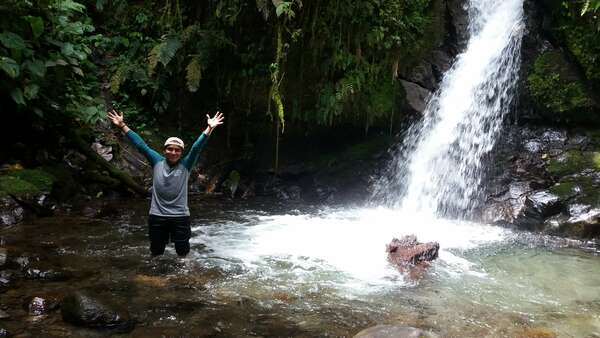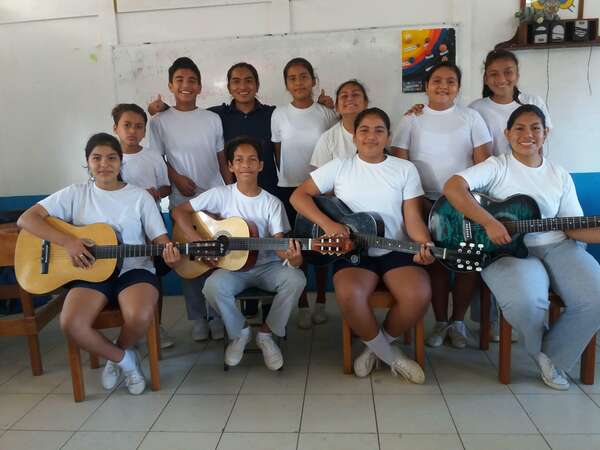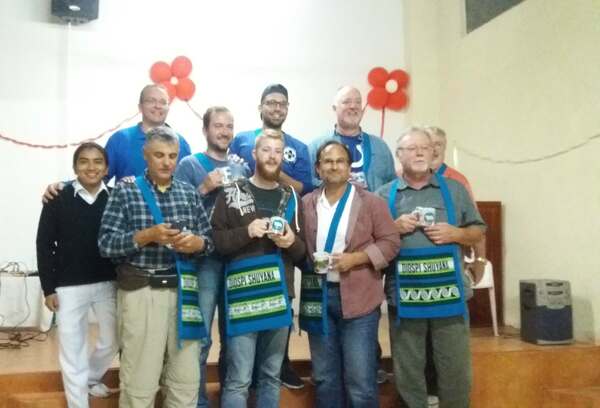Nestled in the highlands of northern Ecuador, Otavalo is a region rich in culture and hailed as the textile hub of indigenous Ecuadorians. Its residents, called Otavaleños, have transformed the region as they achieved high levels of success through exporting their fabrics both domestically and internationally. Jefferson Saransig, our 2022-23 Quechua (Kichwa) FLTA, comes from this rich tapestry of indigenous influence and has woven his own rich fabric of life experiences through stitches of learning, teaching, and traveling.

As a child, Jefferson lived in Otavalo with his parents, grandparents, aunts, and uncles. He recalled being surrounded by the biodiversity of Ecuador and completely interwoven with nature in his early years. In these years, he was imbued with reverence for “Pachamama”--meaning Mother Earth–a lesson that he seeks to weave into his own Quechua language teaching at Notre Dame. At the age of five, Jefferson moved with his parents and siblings from his quiet home in Otavalo to the vibrant capital of Quito and he had to adjust to life in a Spanish-speaking city. Jefferson had Spanish knowledge and the linguistically flexible mind of a child to ease his transition, however, he found that the most difficult task was maintaining ties to his childhood language, Quechua. Jefferson’s parents remained his primary line to the Quechua language and culture, but as they continued to live in Quito, they gradually transitioned to speaking Spanish full time. Now, Jefferson wears the role of a Quechua cultural ambassador for others that his parents once sported for him.
After completing high school in Quito, Jefferson went to Ambato, Ecuador, to study foreign language education at the Universidad Tecnica de Ambato. During this time, English fluency was interwoven into Jefferson’s own rich fabric of skills and knowledge. Upon graduation, Jefferson returned to Quito to teach English in primary school until 2018, when he accepted opportunity to travel to Shanghai as a Spanish teacher. Through this experience, Jefferson’s eyes were opened to yet another new thread of language and culture. After completing his Shanghai teaching stint, he traveled to the Galápagos to be an English teaching volunteer and provided language classes to those who didn’t have the opportunity to travel to learn English. Upon conclusion of his time teaching on the world-renowned archipelago, Jefferson set his sights on graduate school in pursuit of researching linguistics full time. While applying to Fulbright, Jefferson completed his masters degree in Pedagogy from Pontificia Universidad Católica del Ecuador. In fact, during his first month in South Bend in August 2022, Jefferson attended his thesis defense and masters graduation via Zoom.

Now at Notre Dame, Jefferson teaches Quechua to a small cohort of highly motivated students. In addition, he is enrolled in three courses: methods in education research, academic writing for international students, and Chinese calligraphy. He has carefully structured his classes to cultivate a pattern of experiences that he can draw upon while he looks forward to a PhD in bilingualism. In addition to teaching and taking classes, Jefferson has hosted multiple events to share Quechua language and culture with the Notre Dame community.
While Jefferson ultimately hopes to pursue a life in academia, his teaching thus far has been immensely fulfilling. Hearing his students thank him in class was a transformational moment; he began to appreciate the unique opportunity he had to share his knowledge about his home and native tongue to new people as a gift–a way to strengthen the linguistic fabric of our world rather than let indigenous languages fray and unravel. Following teaching at Notre Dame, Jefferson hopes to tackle some issues in Quechua education on a much larger scale by contributing through linguistics research as a doctoral student. He aspires to create standardized methods of structuring Quechua education, providing Quechua teachers with the toolkit necessary to create a successful learning environment.

In his closing remarks, Jefferson wanted to highlight the unique opportunity that Notre Dame provides by offering Quechua classes. While students tend to gravitate towards the world’s most popular languages, studying Quechua not only offers a distinctive resume builder, but also a glimpse into an indigenous culture and worldview. Through Jefferson’s classes, he has exposed his students to new ways of thinking, ecocentric vantage points on nature, and critical questions about our relationship with the world. The value of learning a second language is difficult to understate, and enrolling in Quechua through Notre Dame’s CSLC is a pursuit that allows students here to weave their own rich tapestry of experiences.
About the CSLC
The CSLC is dedicated to the advancement of linguistic proficiency and cultural awareness for students, staff, faculty, and spouses in all languages across the Notre Dame community. If you would like to learn more about studying languages and cultures, Fulbright programs for Notre Dame Students, or cultural events sponsored by the many groups at Notre Dame, visit the CSLC website, or call (574) 631-5881.